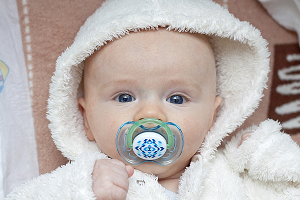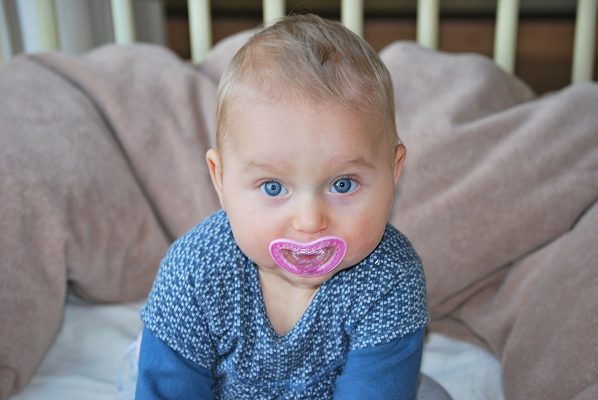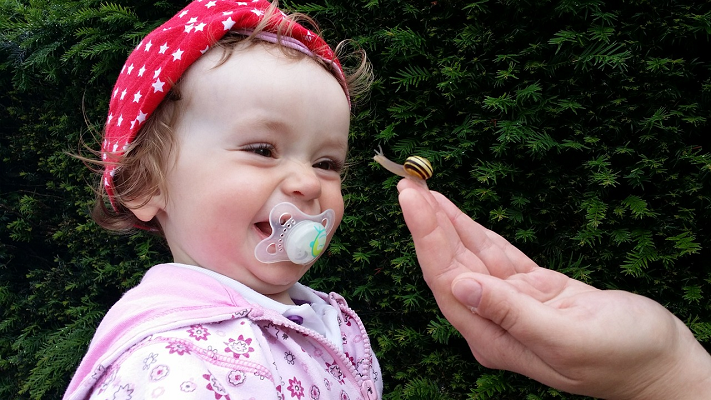
Pacifier or Thumb-Sucking
Pacifier or thumb-sucking: Your child seems to love that pacifier, but you aren’t so crazy about it. You worry that their dependence on it is hurting their baby teeth. How is pacifier usage affecting your baby’s teeth and mouth?
Benefits of Pacifier Use
Before getting to any impact a pacifier or thumb sucking can have on baby teeth, let’s talk about benefits. For babies, pacifier use may offer some protection against Sudden Infant Death Syndrome (SIDS).
Also, pacifiers can help babies learn to soothe themselves by helping their natural urge to suck on something, even when they aren’t hungry and needing to feed.
New Mommy Editor Note: Several studies disagree that pacifier use to reduce the chance of SIDS has a direct correlation ( e.g. https://www.aafp.org/afp/2010/0901/p456.html); instead, they encourage continued efforts to educate caregivers and parents about sleeping positions, parental smoking reduction, and breastfeeding.

The Possibility of Pacifier Teeth
When a child uses a pacifier for too often and too long, it can cause what experts call pacifier teeth. Some of the problems dentists might see include crooked teeth, front teeth that stick out, bite issues, and problems with the alignment of the jaw.
Think of it this way: As your baby’s mouth, teeth, and jaw continue to grow, they are going to work around whatever obstacles are in their way. If your baby frequently has a pacifier in their mouth, it is going to impact the shape and development of your child’s mouth and teeth.
Tooth Rot
Another potential drawback of using a pacifier is the possibility of developing tooth rot. Some parents want their child to use a pacifier so desperately that they try to entice them to take it by dipping it in juice or honey.
Routinely doing that can lead to tooth rot in a child.
Is Thumb Sucking Better?
Some parents think that thumb sucking might be a better choice for their baby than a pacifier. But thumb-sucking is actually worse.
Don’t encourage your child to suck their thumb. If they want to suck on something, stick with a well-designed pacifier. Thumbs will also cause tooth, mouth, and jaw issues for your child.
What makes them worse, though, is that it is harder to regulate thumb sucking. With a pacifier, you’re in total control. You determine when your child will be able to use it and for how long.
With thumb-sucking, your child is in control. Their thumb is with them at all times, so they can engage in thumb-sucking in the middle of the night or any other time you aren’t looking.
When Should I Cut Out the Pacifier?
If you want to avoid the bulk of teeth issues caused by pacifiers, you should make sure your baby ditches the pacifier no later than their second birthday. Ideally, you’ll do it before that because some impact on your child’s teeth may happen by then.
But, for the most part, the worst impact is seen after that time, particularly if the habit is still going strong by the time a child turns 4 years old.

How to Encourage a Child to Quit the Pacifier
Gradually cut down on how much the pacifier is used. Start only letting them use it at nap time or bedtime, and be sure to remove it from their mouth after they fall asleep.
Distraction can be your best friend when trying to help your child quit the pacifier or thumb sucking. When your child cries for their pacifier, try going for a walk with them or having an impromptu dance party just the two of you. Their dependency on their pacifier will begin to wane over time.
Protect Those Teeth
Baby teeth will be with your child for years, so you should make an effort to protect them. By taking some precautions to wean your child off of the pacifier before it becomes a problem, you’ll have one less thing to worry about as a parent.

Jenny Silverstone is a professional writer, editor, and most importantly, the loving mother of two beautiful kids. Jenny’s goal at Mom Loves Best is to help the other moms like her who are struggling and trying to do their best but feel totally overwhelmed.
